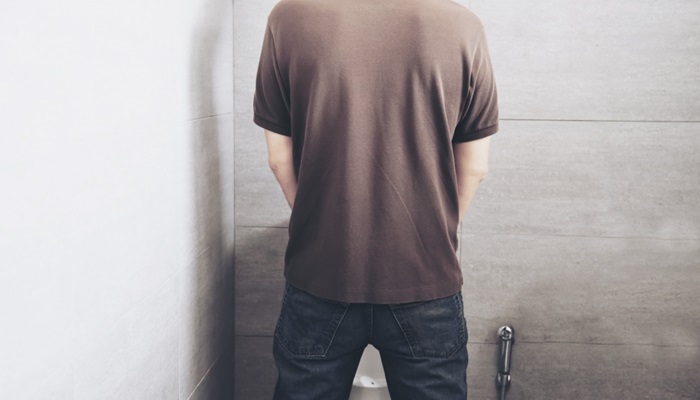Incomplete urination (urinary retention) is a condition where the bladder does not empty completely. This issue is more common in men but can also occur in women. Urinary retention is frequently experienced by older adults.
When you have incomplete urination, your bladder may still feel full after urinating. This happens because the bladder has not emptied entirely. As a result, you may feel the urge to urinate again, even after just having passed a large amount of urine.
So, what causes incomplete urination? Find out more in the following explanation.
Contents
Causes of Incomplete Urination
Several factors can cause incomplete urination, including:
1. Blockages
When something obstructs the flow of urine through the bladder and urethra, you may experience urinary retention. Blockage (obstruction) is one of the most common causes of incomplete urination.
Some reasons why blockages occur include:
- Enlarged prostate: A blockage can happen when the prostate gland enlarges, pressing against the urethra.
- Bladder outlet obstruction: This affects the bladder neck, which is the area just before urine exits the body.
- Ureter obstruction: Ureteral stones, blood clots, tumors, or other factors can cause blockages in the urethra.
- Cystocele: A condition where the bladder drops into the vagina.
- Rectocele: A condition where the rectum pushes into the vaginal wall.
- Urethral stricture: The urethra narrows due to scar tissue formation.
2. Consumption of Certain Medications
Taking certain medications can contribute to incomplete urination. These medications include antihistamines, antispasmodics, opioids, and tricyclic antidepressants. These drugs can alter the way the bladder muscles function.
Other medications that may affect bladder control include:
- Some blood pressure-lowering drugs
- Antipsychotics
- Muscle relaxants
3. Nerve Problems
Did you know that nerve issues can also trigger incomplete urination?
The brain plays a crucial role in the urination process. Urine is expelled when the brain signals the bladder muscles to contract and release urine. The brain also signals the sphincter muscles around the urethra to relax, allowing urine to flow out.
If there is a disruption in how the brain communicates with the nerves, urinary problems can arise.
Causes of nerve-related urinary retention include:
- Stroke
- Diabetes
- Multiple sclerosis (MS)
- Spinal or pelvic trauma from accidents or injuries
- Spinal cord pressure from tumors or herniated discs
- Vaginal childbirth
- Certain types of pelvic surgery
4. Infection or Swelling
Infections and swelling (inflammation) can also affect urine flow through the urethra. Examples of urinary retention caused by infection or inflammation include:
- Prostatitis: Infection or inflammation of the prostate, causing it to swell and press against the urethra, obstructing urine flow.
- Urinary tract infection (UTI): A UTI can cause swelling in the urethra or lead to bladder weakness, both of which can contribute to incomplete urination.
- Sexually transmitted infections (STIs): STIs can cause swelling and lead to urinary retention.
5. Surgery
You may experience urinary retention after undergoing joint replacement surgery (such as hip replacement) or spinal surgery. General anesthesia used during these procedures can also temporarily cause urinary retention.
Treatment for Incomplete Urination
The treatment for incomplete urination or urinary retention depends on the underlying cause. Some causes are easier to treat than others.
Doctors may recommend the following treatments and management options:
- Antibiotics for urinary tract infections
- Physical therapy for pelvic floor dysfunction
- Changing medications if prescription drugs are the cause
- Using a catheter to drain the bladder
- A surgical procedure called urethral dilation to treat a blocked or narrowed urethra
- Inserting a stent into the urethra to prevent future blockages
- Surgery to remove enlarged prostate tissue, prostate tumors, or even the prostate itself
- Surgical repair for cystocele
Sometimes, doctors may also recommend lifestyle changes, such as drinking more water, urinating as soon as the urge arises, or increasing physical activity.
Rezum Therapy for Incomplete Urination
Incomplete urination can also be caused by benign prostatic hyperplasia (BPH), a condition characterized by an enlarged prostate gland. If this is the case, a doctor may recommend Rezum therapy.
What is Rezum Therapy?
Rezum therapy is a non-surgical treatment that uses the natural energy stored in steam to remove excess prostate tissue that is pressing against the urethra.
Benefits of Rezum Therapy:
- Safe and effective procedure with long-term results
- Eliminates the need for prostate enlargement medications
- Improvement in BPH symptoms within a few weeks
- Preserves sexual function
- An outpatient procedure (patients can go home the same day)
- Does not require general anesthesia
- Quick recovery time
- Can be repeated if BPH symptoms return
If you are interested in trying Rezum therapy for incomplete urination caused by benign prostate enlargement, you can visit Mandaya Puri Hospital. Our hospital offers Rezum therapy, supported by a team of expert urologists.
Do you have further questions about incomplete urination or urinary retention? Want to learn more about Rezum therapy?
Feel free to visit the Urology Center at Mandaya Royal Hospital Puri and consult with our specialist urologists.
Use the Chat via WhatsApp, Book Appointment, or Care Doctor app (available on Google Play and the App Store) to simplify your visit, check queue numbers, and access complete information.



